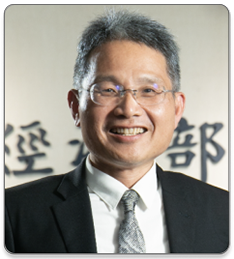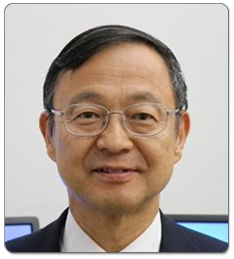9/10(Tue.) am9:00~12:00
Introducer

Director-General, Water Resources Agency, Ministry of Economic Affairs
Chien-Hsin Lai
Dr. Lai has been the Director-General of WRA since 2016. Responding to climate change, he accomplished legal works of Reclaimed Water Resources Development Act and Runoff Distribution and Outflow Control policy. He also promotes Forward-looking Infrastructure Development Program for water environment to establish industrial sustainability and water resilience in Taiwan.
Moderator

Digital Deputy Editor-in-Chief, Scientific American
Ching-Chi Cheng
With over 20 years of experience in interviewing and editing, I have previously worked for National Geographic magazine and Business Weekly. My focus has been particularly on environmental and natural ecology themes.
Keynote Speech

President, Japan Foundation of River & Basin Integrated Communications
Koji IKEUCHI
For many years, he has worked on policy planning and project implementation for natural disaster countermeasures such as flood countermeasures. He has experience in responding to many disasters in the field. His main career history is as follows. Joined the Ministry of Construction ( The predecessor of MLIT ( Ministry of Land, Infrastructure, Transport and Tourism ) ) in 1982. Director General, Water and Disaster Management Bureau, MLIT (2014 – 2015). Vice Minister for Engineering Affairs, MLIT (2015–2016). Professor, Department of Civil Engineering, The University of Tokyo (2016 – 2023). President, Foundation of River & Basin Integrated Communications / Emeritus Professor, The University of Tokyo (2023– present)
The title of speech
Building a resilient society to cope with water-related disasters intensified by climate change
Short abstract of speech
Due to climate change, the frequency of flooding in Japan is expected to increase by a factor of two to four in the future. In response to this, plans for structural measures are being reviewed to adapt to climate change.
In addition to the flood control measures mainly taken by river administrators, stakeholders in the basin are working together to implement comprehensive and multi-layered measures to address hazards, exposures, and vulnerabilities.

Professor, Department of Geography, National Taiwan University
Sue-Ching Jou
Member of the Ministry of Economic Affairs Water Resources Review Committee, Director of the National Science and Technology Center for Disaster Reduction, Member of the Disaster Prevention and Rescue Expert Advisory Committee of the Executive Yuan, Deputy Director of the Science and Technology Policy Advisory Office of the Executive Yuan's Science and Technology Advisory Group, Deputy Director of the Humanities and Social Sciences Development Center of the Ministry of Science and Technology, Vice Dean of the College of Science at National Taiwan University, Director of the International Program on Climate Change and Sustainable Development at National Taiwan University, Chairman of the Taiwan Intelligent Living Space Development Association.
The title of speech
Integrating Blue and Green for Sustainable Environments
Short abstract of speech
To address climate change and promote sustainable development, hydraulic engineering and construction are moving away from the 20th-century focus on protective and rigid structures. The new approach prioritizes creating and restoring water environments with goals of safety, prosperity, sustainability, and resilience. This involves using site-specific, systematic, and nature-based design principles. Key areas of innovation include developing new institutional and technical methods, engaging citizens and NGOs, integrating blue and green infrastructure, creating multifunctional ecosystem services, and enhancing local revitalization and well-being. These aspects present both challenges and opportunities for modern water management.

Associate Professor, IHE Delft, Netherlands
Zoran Vojinovic
Zoran Vojinovic leads the Blue-Green-Grey infrastructure group for stormwater and wastewater management at IHE Delft. With over 25 years of global water sector experience, he worked closely with various international and national donors and development organisations such as the European Commission (EC), the Asian Development Bank, the World Bank and UN agencies, notably the United Nations Development Program (UNDP) and he has been advisor to governments on matters related to water and wastewater management, flood risk mitigation and climate change adaptation. In 2013, he has been awarded the Water Champion recognition by the Asian Development Bank for his achievements in Asia. He now leads the EC-funded RECONECT project with 37 international partners aiming to develop and demonstrate innovative large-scale Nature Based Solutions for hydro-meteorological risk reduction across Europe, Asia, Central and South America and the Caribbean (http://www.reconect.eu/). Zoran organized and chaired the recent conference on Nature-Based Solutions (https://www.nbs4waterandclimate.eu/),
The title of speech
Nature-Based Solutions for water security and climate adaptation: findings from the EC RECONECT project
Short abstract of speech
There is growing evidence that traditional interventions for the reduction of hydro-meteorological risks (e.g., floods, droughts, heatwaves, storms, coastal storm surges, tropical cyclones, landslides, wildfires) have focused on grey infrastructure measures which are often limited in their approach and effects. A new response towards disaster risk reduction, water security, and resilience to climate change, which has a potential to be more effective and sustainable than traditional measures, is currently passing under the name of Nature-Based Solutions (NBS).
Despite the potential of these interventions, in practice, NBS are still being applied at a slow rate while traditional grey infrastructure remains as a preferred choice. This can be attributed to several barriers which range from political and governance to social and technological/technical. More generally, there is a lack of sufficient knowledge base to accelerate their wider acceptance and uptake. This speech provides contribution in this direction and addresses the question of effectiveness of NBS and refers to examples from the EC-funded RECONECT project.